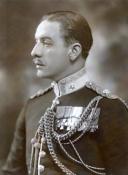
War Memorial
| Major Percy Howard HANSEN VC DSO MC | |
|
6th (Service) Battalion Lincolnshire Regiment attached to the Royal Berkshire and the Border Regiment Date of birth: 26th October 1890 Date of death: 12th February 1951 Died aged 60 Unknown |

|
| Percy Howard Hansen was born in South Africa on the 26th of October 1890, the eldest son of Viggo Julius Hansen and Elsa (nee Been) Hansen. The family moved to England around 1901-1902 and lived at 39 Hyde Park Gate London SW. He was educated at Hazelwood School from September 1899 until July 1904 where he was a member of the Choir and of the Football XI in 1903. The school magazine made the following comments on his 1903 football season: "(Left half) - A very energetic performer, though somewhat weak with his left foot; kicks a good corner." On leaving the school the magazine wrote the following of him: - "....goes to Eton. He has done good service at football and hockey, and in the choir." He went on to Eton College where he started at the school on the 20th of September 1904 and was in John Maximilian Dyer’s house, leaving on the 29th of July 1908. He became a naturalised British citizen on the 13th of December 1910. He went on to the Royal Military College Sandhurst on the 29th of July 1909 and was commissioned as a 2nd Lieutenant in the Lincolnshire Regiment on the 11th of March 1911 being promoted to Lieutenant on the 3rd of August 1912. He was appointed as Adjutant and was promoted to temporary Captain of the 6th Battalion on the 4th of September 1914. While the battalion was undergoing training at Grantham, he was confirmed in the rank of Captain on the 2nd of February 1915. On the 1st of July 1915 the battalion sailed from Liverpool reaching Alexandria on the 12th. On the 18th of July they sailed to Mudros and were at Cape Helles from the 20th to the 31st of July where they suffered their first casualties before they were withdrawn for a landing further up the coast. They landed at Suvla Bay at Gallipoli on the night of the 6th/ 7th of August where they landed before first light as Brigade reserve. At 2pm on the 7th of August they were ordered into the attack to take a position know as Chocolate Hill. After the initial assault failed they rallied and carried the hill at the point of the bayonet. By the end of the fighting Captain Hansen was in temporary command of the battalion. At 2am on the morning of the 9th of August the battalion moved out of bivouacs near Lala Baba and moved forward for another attack. At 4.10am they reached Hill 70 where they came under rifle fire. As the battalion attacked they were held up short of their objective and dug in until 12.15pm when they were forced to withdraw. Casualties had been heavy; the trenches were choked with dead and wounded men with many of the wounded trapped in no man’s land where fires had started in the dry scrub which covered the area. When Percy Hansen arrived back at the start line he called for volunteers to return to the burning scrub and rescue the wounded. Lance Corporal A. H. Breeze and two others who accompanied him were awarded the Distinguished Service Medal and Captain Hansen was awarded the Victoria Cross. The award of the Victoria Cross appeared in the London Gazette of the 1st of October 1915 and the citation read:- “For most conspicuous gallantry on the 9th of August 1915, at Yilghin Burnn, Gallipoli Peninsular. After the second capture of the “Green Knoll” his battalion was forced to retire leaving some wounded behind, owing to the intense heat from the scrub which had been set on fire. When the retirement was effected Captain Hansen, with three or four volunteers, on his own initiative, dashed forward several times some 300 to 400 yards over open ground into the scrub under a terrific fire, and succeeded in rescuing from inevitable death by burning, no less than six wounded.” He was promoted to Temporary Major on the 11th of August 1915. He was awarded the Military Cross on the 9th of September 1915 for his actions at Suvla Bay when he made a reconnaissance of the coast, stripping himself and carrying only a revolver and a blanket for disguise. He swam and scrambled over rocks being severely cut and bruised and obtained some valuable information, locating a gun which was causing much damage. On one occasion he met a party of 12 Turks who did not see him and later a single Turk whom he killed. He returned to the lines in a state of exhaustion. He was mentioned in despatches five times and served in France, Egypt and at Gallipoli as well as on the General Staff. He served in Egypt from September to October 1915. He received his Victoria Cross at Buckingham Palace from the King on the 4th of December 1915. On the 8th of June 1916 he was promoted to Brigade Major and attached to Headquarters at Hatton Park until the September. He was appointed as a General Staff Officer 2nd Grade on the 4th of August 1917 and was promoted to Temporary Major on the 25th of February 1918. During this period he served on the Staff in France and Belgium. He was awarded the Distinguished Service Order on the 16th of September 1918, the citation read:- “For conspicuous gallantry and devotion to duty. He volunteered to carry out a reconnaissance and brought back valuable information obtained under heavy artillery and machine gun fire, which had been unprocurable from other sources. Throughout he did fine work.” From November 1918 to January 1919 he served at the Tactical School at Camberley; he was promoted to Brevet Major on the 1st of January 1919. In 1919 he competed in the Kingswood Sculls at Henley where he was runner up to W.D. Kinneir. Following a course at Staff College he was posted to the 8th Infantry Brigade, Southern Command as a Brigade Major on the 9th of February 1920, a position he held until the 22nd of June. He later served in the same capacity with 12th Infantry Brigade from the 9th of February 1922 until the 5th of July 1923. He was posted to the 55th (West Lancashire) Division (TA) as a Staff Officer on the 10th of February 1925 serving there until the 9th of February 1929. He was promoted to Major on the 15th of November 1927. Later in February 1929 he was posted as a Staff Officer to Army Headquarters in Jamaica where he became Inspector General of West Indian Local Forces from the 31st of March 1931. He was given command of the 2nd Battalion of the Lincolnshire Regiment on his promotion to Lieutenant Colonel on the 9th of September 1937. Following the outbreak of the Second World War he was promoted to Colonel on the 5th of September 1939 (with seniority from the 1st of July 1935) and reverted to his staff role as Quarter Master General to 55th Division. He was promoted to Brigadier in 1941 and commanded the Belfast area from 1941 to 1943 before being made head of Civil Affairs for Norway under SHAEF from August 1943 until July 1945. He was awarded the Royal Order of St Olav by Norway. He was also awarded the Legion of Merit by the United States and the citation for his award read: - "Brigadier Percy H. Hansen, British Army, in cooperation with the forces of the Army of the United States, distinguished himself by exceptionally meritorious conduct in the performance of outstanding services, as Head of the Civil Affairs Unit, Supreme Headquarters Allied Expeditionary Force Mission to Norway from August 1943 to July 1945. His keen understanding of the problems involved in administering Civil Affairs in a liberated country, and the efficient plans of organisation and operation which he established, enabled the Allies to successfully undertake its mission to Norway. His contribution to the military effort reflects high credit upon himself, and the military service of the United States and their Allies." He became engaged to Lady Poulett in late 1921 but they never married. Instead he married Marie Rose (nee Emsell) and they had one daughter. He died of pneumonia in Copenhagen. The Percy Hansen Academic Scholarship was later instituted at Hazelwood School in his memory. |
|
| Went on to Eton College |
Back